Oral Care
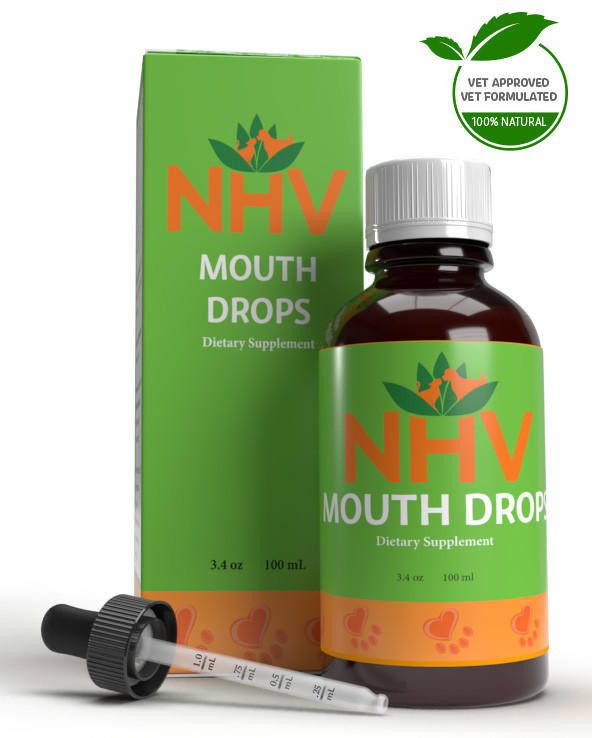
free shipping over $100 (USA & Canada)
1-877-937-4372 the pet expert hotline
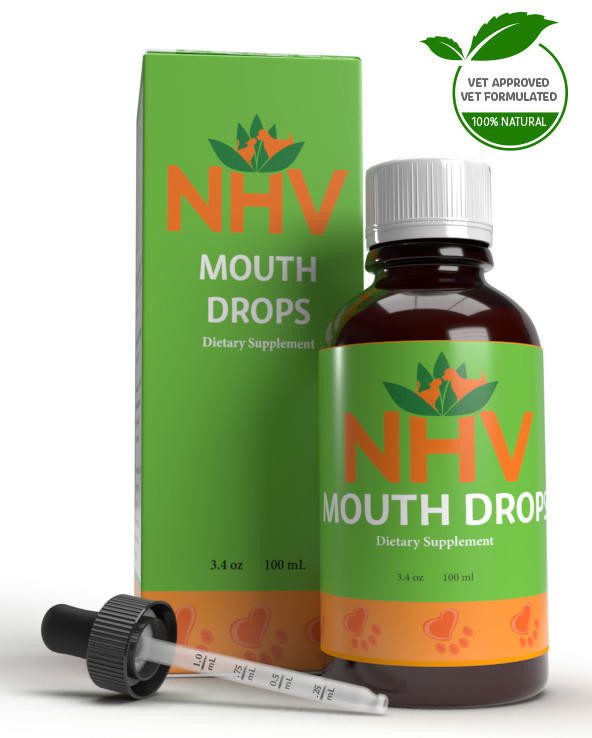
A natural herbal oral supplement that aids in eliminating bad breath, gingivitis, and helps combat bacterial infections of the mouth and helps guard against tooth decay and plaque.

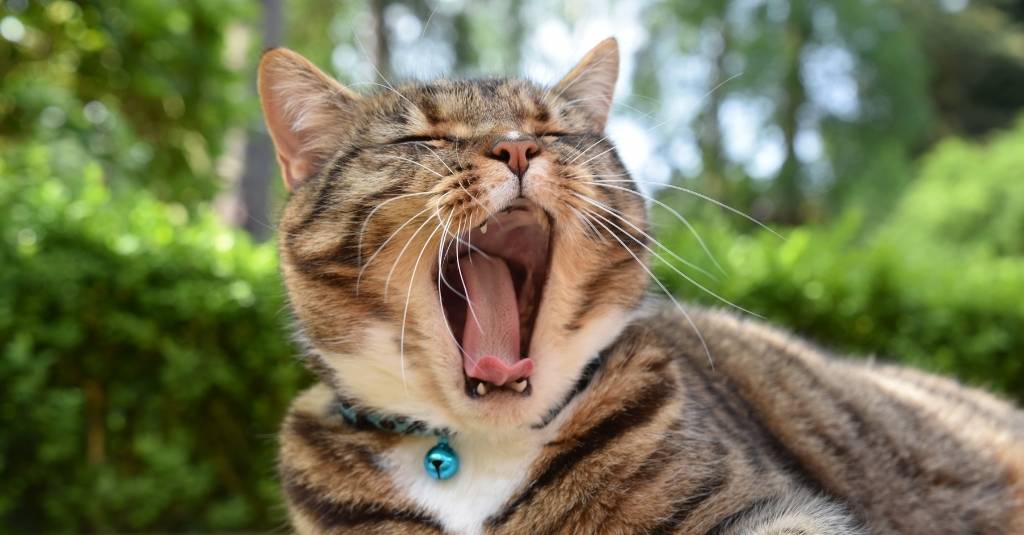
Dental health is a very important part of your pet’s overall health and is linked to other health problems. Your pet’s teeth and gums should be checked at least once a year (or twice a year in senior patients) by your veterinarian to look for early signs of a problem and keep your pet’s mouth healthy. At least 50% of our patients on a daily basis have some degree of dental disease.
Periodontal disease is the most common condition in dogs and cats.
Periodontal disease is the most common condition in dogs and cats. By the time your pet is three years old, he or she will very likely have some early evidence of periodontal disease, which can worsen as your pet grows older if effective preventative measures aren’t taken.
Do you have any questions about your pet’s health? Feel free to contact us to chat with our pet expert.
Oral Care

A natural herbal oral supplement that aids in eliminating bad breath, gingivitis, and helps combat bacterial infections of the mouth and helps guard against tooth decay and plaque.
buy 2 and save $3
3 month supply for a small to medium size pet.
1 bottle = 3 oz (100 ml)

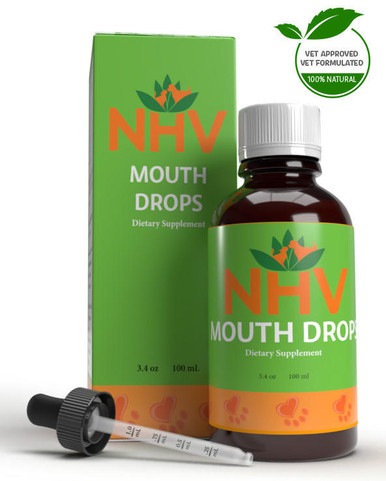
1 bottle = 3 oz (100 ml)

Does your pet have morning breath that lasts all day long? Mouth Drops from NHV Natural Pet Products are like a mouthwash for pets that helps eliminate bad breath, helps gingivitis, combats bacterial infections, and fight your pet's tooth decay and other dental problems. Use in combination with a nutritious diet and regular brushing to maintain the health of your pet’s teeth.
Mouth Drops may be beneficial for these conditions:
Additional Support:
Never attempt to diagnose a pet. A vet will be able to perform the required test and make the necessary suggestion.
White Oak – White oak is a type of hardwood tree native to eastern and central North America. It is traditionally used as an antiseptic, astringent, and anti-inflammatory herb. It has antiviral, antilithic, and astringent properties that control pain, inflammation, and help control bleeding.
Plantain – Plantain is an astringent, antibacterial, demulcent, emollient and anti-inflammatory herb. It has expectorant properties that soothe and lubricate internal mucous membranes, and helps stop bleeding.
Sage – Sage is often recommended as an antiseptic, and is commonly used for infections or sores of the mouth as well as topically for pets with gingivitis. It has anti-fungal, antiviral, astringent, diaphoretic and carminative properties. It also contains essential oils with antibacterial properties that neutralize mouth odor.
Echinacea Angustifolia – Commonly used for infections, Echinacea Angustifolia contains many active chemicals such as polysaccharides, flavonoids, caffeic acid, essential oils, alkylamides and polyacetylenes that can defend against microorganisms, have strong immune-stimulating and antiviral and antibacterial properties
Myrrh – It strengthens and activates the immune system and helps fight infections. It helps soothe inflamed gums, canker sores, loose teeth, and eliminates bad breath.
Neem – Neem has antibacterial, anti-fungal, anti-inflammatory, analgesic, and alterative properties, and is also high in antioxidants. Studies have found that it helps reduce plaque build up, helps with gum bleeding, and reduces bacteria and bad breath.
Select your pet's weight to determine the correct dose.
Topically: To be taken twice daily. 1 drop for every 2 lb of body weight twice a day up to 50 lb. This is the minimum dosage.
Using the dropper squirt the dosage along teeth and gums.
Orally: To be taken twice daily. Determine your pet’s weight and then use the easy chart below to determine the correct dose. This is the minimum dosage.
Pet's Weight Dosage
0 - 15 lb = 0.5 ml
16 - 30 lb = 1.0 ml
31 - 45 lb = 1.5 ml
46 - 60 lb = 2.0 ml
61 - 75 lb = 2.5 ml
Over 75 lb = 3.0 ml
Some pets may require a larger dosage due to their metabolism. You can safely double the recommended dosage.
How to Administer
Shake well before use. Use the dropper provided to squirt the dosage directly into your pet’s mouth along the gums and teeth.. Some pets may be finicky and resist your attempts to administer drops directly into their mouth. If this occurs, try placing the drops in your pet’s food or favourite treat. You may want to consider hiding the drops in foods most pet’s love such as fish, chicken, or yogurt. When serving dry food, use the dropper to soak a few kibbles at feeding time.
For Best Results
Herbal dietary supplements are beneficial to the health and wellbeing of your pet and are safe for long-term use. Every pet responds to natural herbal supplements differently, therefore it is important to be consistent and administer the product daily. Supplements generally take two to four weeks to take effect, however this will vary from one animal to the next.
Product Storage
All NHV Natural Pet Products are pure herbal extracts and contain no artificial additives, preservatives or coloring. Shelf life after opening is 6 months and must be refrigerated after opening.
Cautions and Contraindications
Do not use Mouth Drops in pregnant or nursing animals. Speak to your vet before using our products. A second visit is recommended if your pet’s condition does not improve, or deteriorates after continued use of the supplements.
All information provided by NHV Natural Pet Products is for educational purposes only.
Does your pet have morning breath that lasts all day long? Mouth Drops from NHV Natural Pet Products are like a mouthwash for pets that helps eliminate bad breath, helps gingivitis, combats bacterial infections, and fight your pet's tooth decay and other dental problems. Use in combination with a nutritious diet and regular brushing to maintain the health of your pet’s teeth.
Mouth Drops may be beneficial for these conditions:
Additional Support:
Never attempt to diagnose a pet. A vet will be able to perform the required test and make the necessary suggestion.
White Oak – White oak is a type of hardwood tree native to eastern and central North America. It is traditionally used as an antiseptic, astringent, and anti-inflammatory herb. It has antiviral, antilithic, and astringent properties that control pain, inflammation, and help control bleeding.
Plantain – Plantain is an astringent, antibacterial, demulcent, emollient and anti-inflammatory herb. It has expectorant properties that soothe and lubricate internal mucous membranes, and helps stop bleeding.
Sage – Sage is often recommended as an antiseptic, and is commonly used for infections or sores of the mouth as well as topically for pets with gingivitis. It has anti-fungal, antiviral, astringent, diaphoretic and carminative properties. It also contains essential oils with antibacterial properties that neutralize mouth odor.
Echinacea Angustifolia – Commonly used for infections, Echinacea Angustifolia contains many active chemicals such as polysaccharides, flavonoids, caffeic acid, essential oils, alkylamides and polyacetylenes that can defend against microorganisms, have strong immune-stimulating and antiviral and antibacterial properties
Myrrh – It strengthens and activates the immune system and helps fight infections. It helps soothe inflamed gums, canker sores, loose teeth, and eliminates bad breath.
Neem – Neem has antibacterial, anti-fungal, anti-inflammatory, analgesic, and alterative properties, and is also high in antioxidants. Studies have found that it helps reduce plaque build up, helps with gum bleeding, and reduces bacteria and bad breath.
Select your pet's weight to determine the correct dose.
Topically: To be taken twice daily. 1 drop for every 2 lb of body weight twice a day up to 50 lb. This is the minimum dosage.
Using the dropper squirt the dosage along teeth and gums.
Orally: To be taken twice daily. Determine your pet’s weight and then use the easy chart below to determine the correct dose. This is the minimum dosage.
Pet's Weight Dosage
0 - 15 lb = 0.5 ml
16 - 30 lb = 1.0 ml
31 - 45 lb = 1.5 ml
46 - 60 lb = 2.0 ml
61 - 75 lb = 2.5 ml
Over 75 lb = 3.0 ml
Some pets may require a larger dosage due to their metabolism. You can safely double the recommended dosage.
How to Administer
Shake well before use. Use the dropper provided to squirt the dosage directly into your pet’s mouth along the gums and teeth.. Some pets may be finicky and resist your attempts to administer drops directly into their mouth. If this occurs, try placing the drops in your pet’s food or favourite treat. You may want to consider hiding the drops in foods most pet’s love such as fish, chicken, or yogurt. When serving dry food, use the dropper to soak a few kibbles at feeding time.
For Best Results
Herbal dietary supplements are beneficial to the health and wellbeing of your pet and are safe for long-term use. Every pet responds to natural herbal supplements differently, therefore it is important to be consistent and administer the product daily. Supplements generally take two to four weeks to take effect, however this will vary from one animal to the next.
Product Storage
All NHV Natural Pet Products are pure herbal extracts and contain no artificial additives, preservatives or coloring. Shelf life after opening is 6 months and must be refrigerated after opening.
Cautions and Contraindications
Do not use Mouth Drops in pregnant or nursing animals. Speak to your vet before using our products. A second visit is recommended if your pet’s condition does not improve, or deteriorates after continued use of the supplements.
All information provided by NHV Natural Pet Products is for educational purposes only.
multivitamin support
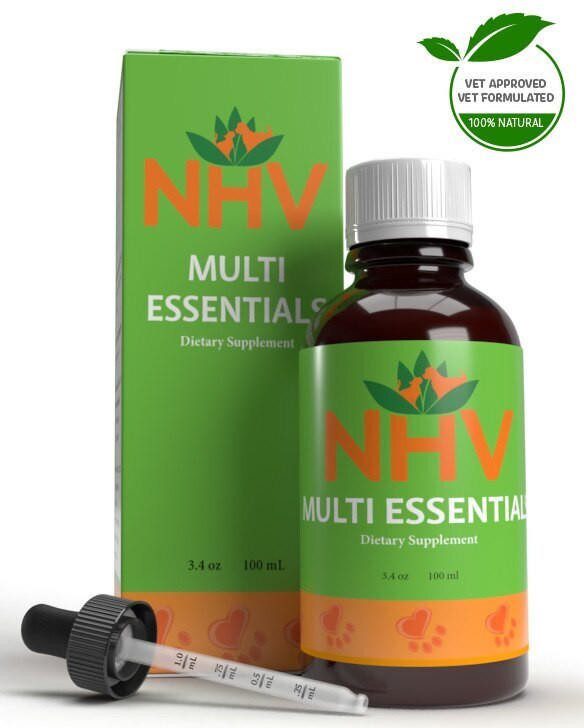
Herbal Digestive Aid, Energy Booster, and Multivitamin for Dogs
buy 2 and save $3
3 month supply for a small to medium size pet
NHV’s multivitamins for dogs targets the brain, stomach, major arteries, kidneys, and liver with a powerful blend of herbal support.

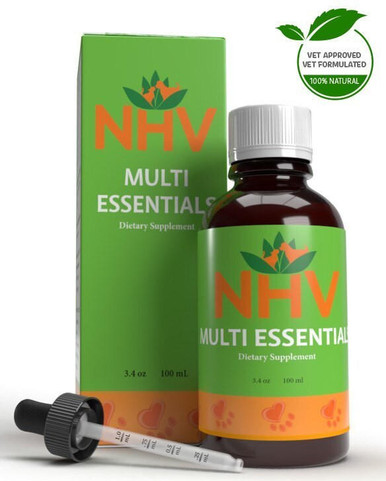
NHV’s multivitamins for dogs targets the brain, stomach, major arteries, kidneys, and liver with a powerful blend of herbal support.

Millions of people take multivitamins daily to support their health, and it only makes sense our canine companions can benefit just as much. This 100% natural plant-based liquid blend can help your dog with nutritional deficiencies.
Signs of Possible Vitamin Deficiency in Dogs
NHV’s Multi-Essentials are packed with herbs that are rich in vitamins and minerals. This vet-formulated blend is designed to benefit your dog’s health using all-natural organically grown herbs with no additives or preservatives.
Even if your pet is healthy, supplying a multivitamin is essential to maintain good health, and some pets need more vitamins and minerals than others. For more, read NHV’s blog, vet talk with Dr. Hillary Cook.
Benefits of NHV’s Multivitamins for Dogs
You can read NHV's blog about the importance of dog vitamin supplements. All pets can benefit from NHV’s Natural Pet Product, even small exotic pets.
If you have questions about plant-based supplements including our multivitamins for dogs, you can schedule a consultation with one of our highly trained holistic veterinarians, because, at NHV, total health and wellness for all pets is our top priority.
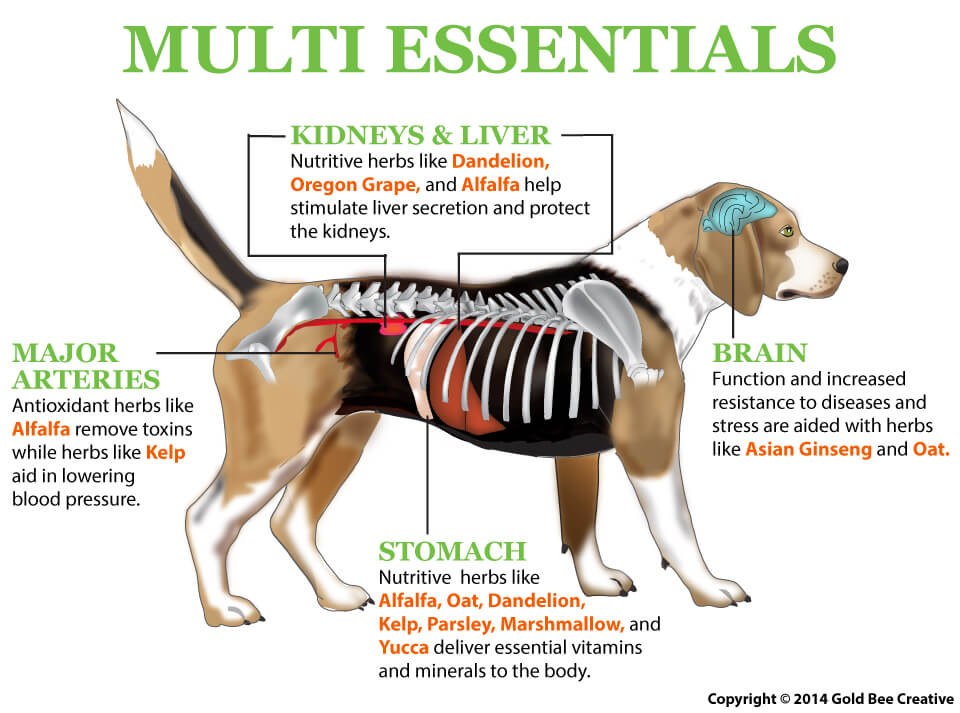
Select your pet's weight to determine the correct dose.
To be taken twice daily. Determine your pet’s weight and then use the easy chart below to determine the correct dose. This is the minimum dosage.
Pet's Weight Dosage
0 - 15 lb = 0.5 ml
16 - 30 lb = 1.0 ml
31 - 45 lb = 1.5 ml
46 - 60 lb = 2.0 ml
61 - 75 lb = 2.5 ml
Over 75 lb = 3.0 ml
How to Administer
Shake well before use. The easiest method is to use the dropper provide and places the drops into your pet’s food or favorite treat. You can also use the dropper and squirt directly into the pet’s mouth.
Some pets can be finicky, if this occurs consider hiding the drops in foods most pet’s love such as fish, chicken or yogurt or a favourite treat. If your pet only eats dry food then soak a few kibbles at feeding time.
For Best Results
Herbal dietary supplements are beneficial to the health and wellbeing of your pet and are safe for long-term use. Every pet responds to natural herbal supplements differently, therefore it is important to be consistent and administer the product daily. Supplements generally take two to four weeks to take effect, however this will vary from one animal to the next.
Product Storage
All NHV Natural Pet Products are pure herbal extracts and contain no artificial additives, preservatives or coloring. Shelf life after opening is 6 months and must be refrigerated after opening.
Cautions and Contraindications
Do not use Multi Essentials in pregnant or nursing animals. Speak to your vet before using our products. A second visit is recommended if your pet’s condition does not improve, or deteriorates after continued use of the supplements.
All information provided by NHV Natural Pet Products is for educational purposes only.
Millions of people take multivitamins daily to support their health, and it only makes sense our canine companions can benefit just as much. This 100% natural plant-based liquid blend can help your dog with nutritional deficiencies.
Signs of Possible Vitamin Deficiency in Dogs
NHV’s Multi-Essentials are packed with herbs that are rich in vitamins and minerals. This vet-formulated blend is designed to benefit your dog’s health using all-natural organically grown herbs with no additives or preservatives.
Even if your pet is healthy, supplying a multivitamin is essential to maintain good health, and some pets need more vitamins and minerals than others. For more, read NHV’s blog, vet talk with Dr. Hillary Cook.
Benefits of NHV’s Multivitamins for Dogs
You can read NHV's blog about the importance of dog vitamin supplements. All pets can benefit from NHV’s Natural Pet Product, even small exotic pets.
If you have questions about plant-based supplements including our multivitamins for dogs, you can schedule a consultation with one of our highly trained holistic veterinarians, because, at NHV, total health and wellness for all pets is our top priority.

Select your pet's weight to determine the correct dose.
To be taken twice daily. Determine your pet’s weight and then use the easy chart below to determine the correct dose. This is the minimum dosage.
Pet's Weight Dosage
0 - 15 lb = 0.5 ml
16 - 30 lb = 1.0 ml
31 - 45 lb = 1.5 ml
46 - 60 lb = 2.0 ml
61 - 75 lb = 2.5 ml
Over 75 lb = 3.0 ml
How to Administer
Shake well before use. The easiest method is to use the dropper provide and places the drops into your pet’s food or favorite treat. You can also use the dropper and squirt directly into the pet’s mouth.
Some pets can be finicky, if this occurs consider hiding the drops in foods most pet’s love such as fish, chicken or yogurt or a favourite treat. If your pet only eats dry food then soak a few kibbles at feeding time.
For Best Results
Herbal dietary supplements are beneficial to the health and wellbeing of your pet and are safe for long-term use. Every pet responds to natural herbal supplements differently, therefore it is important to be consistent and administer the product daily. Supplements generally take two to four weeks to take effect, however this will vary from one animal to the next.
Product Storage
All NHV Natural Pet Products are pure herbal extracts and contain no artificial additives, preservatives or coloring. Shelf life after opening is 6 months and must be refrigerated after opening.
Cautions and Contraindications
Do not use Multi Essentials in pregnant or nursing animals. Speak to your vet before using our products. A second visit is recommended if your pet’s condition does not improve, or deteriorates after continued use of the supplements.
All information provided by NHV Natural Pet Products is for educational purposes only.
multivitamin support
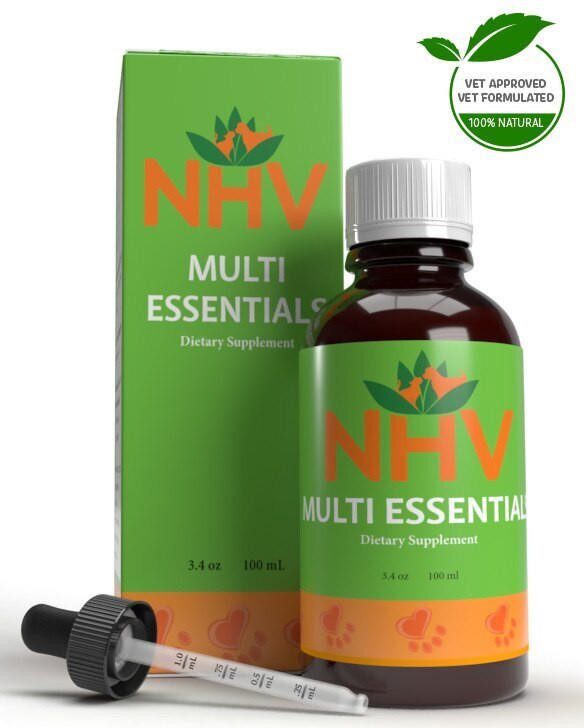
Herbal Digestive Aid, Energy Booster, and Multivitamin for Cats
buy 2 and save $3
3 month supply for a small to medium size pet
These multivitamins for cats will ensure your kitty (of any age) is getting an extra dose of minerals and vitamins for extra energy, vitality, and health.

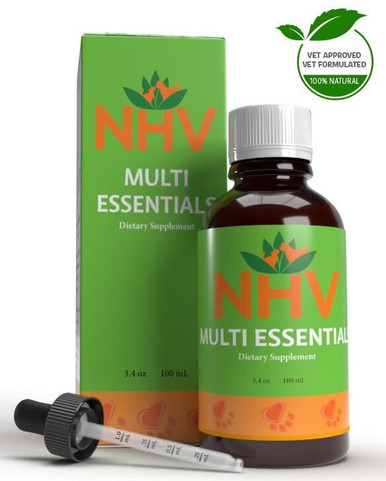
These multivitamins for cats will ensure your kitty (of any age) is getting an extra dose of minerals and vitamins for extra energy, vitality, and health.

The health benefits of multivitamins aren’t just for humans. Cats have many of the same nutrient needs as we do, and some need even more than others depending on their age and health.
A multivitamin supplies the vital nutrients your kitty needs to be healthy and to fight off potential health problems. Dr. Cook, DVM, CVA in her blog states that vitamins “help to regulate the body processes, protect the body from environmental toxins, and break down nutrients such as carbohydrates, proteins, and fats so the body can utilize them”.
The best way to give your cat vitamins and minerals are from whole food sources and not just isolated synthetic vitamins. NHV Multi Essentials contains a powerful blend of alfalfa, oat, dandelion, kelp, parsley, marshmallow, chickweed, stinging nettle, Asian ginseng, yucca and Oregon grape.
Health Benefits of NHV’s Multi-Essentials for Cats
With NHV’s multi vitamins for cats, you get a proprietary blend of all-natural ingredients that are organically grown and contain no artificial additives, preservatives, or coloring. Some of the health benefits include:
Multivitamins for cats will ensure your kitty is getting the proper nutrients that could be lacking due to daily stressors, a poor diet, and environmental toxins.
Signs of Vitamin Deficiency in Your Cat
Kitties Who’ve Benefited from NHV Multi Essentials
NHV multi vitamin for cats has helped thousands of pets around the world. Here are just a few of their stories:
DEALING WITH DIGESTIVE ISSUES: MICI THE CAT LOVES HIS VITAMINS NHV MULTI ESSENTIALS
HERBAL MULTIVITAMINS AND TURMERIC HELP CATS, OATMEAL AND MELISSA LIVE HAPPIER
CAN CATS WITH FELV LIVE A HEALTHY AND NORMAL LIFE?
If you have questions regarding holistic support including vitamin supplements for cats, ask an NHV expert because, at NHV, we want your cat to feel clawtastic naturally!
Select your pet's weight to determine the correct dose.
To be taken twice daily. Determine your pet’s weight and then use the easy chart below to determine the correct dose. This is the minimum dosage.
Pet's Weight Dosage
0 - 15 lb = 0.5 ml
16 - 30 lb = 1.0 ml
31 - 45 lb = 1.5 ml
46 - 60 lb = 2.0 ml
61 - 75 lb = 2.5 ml
Over 75 lb = 3.0 ml
How to Administer
Shake well before use. The easiest method is to use the dropper provide and places the drops into your pet’s food or favorite treat. You can also use the dropper and squirt directly into the pet’s mouth.
Some pets can be finicky, if this occurs consider hiding the drops in foods most pet’s love such as fish, chicken or yogurt or a favorite treat. If your pet only eats dry food then soak a few kibbles at feeding time.
For Best Results
Herbal dietary supplements are beneficial to the health and wellbeing of your pet and are safe for long-term use. Every pet responds to natural herbal supplements differently, therefore it is important to be consistent and administer the product daily. Supplements generally take two to four weeks to take effect, however this will vary from one animal to the next.
Product Storage
All NHV Natural Pet Products are pure herbal extracts and contain no artificial additives, preservatives or coloring. Shelf life after opening is 6 months and must be refrigerated after opening.
Cautions and Contraindications
Do not use Multi Essentials in pregnant or nursing animals. Speak to your vet before using our products. A second visit is recommended if your pet’s condition does not improve, or deteriorates after continued use of the supplements.
All information provided by NHV Natural Pet Products is for educational purposes only.
The health benefits of multivitamins aren’t just for humans. Cats have many of the same nutrient needs as we do, and some need even more than others depending on their age and health.
A multivitamin supplies the vital nutrients your kitty needs to be healthy and to fight off potential health problems. Dr. Cook, DVM, CVA in her blog states that vitamins “help to regulate the body processes, protect the body from environmental toxins, and break down nutrients such as carbohydrates, proteins, and fats so the body can utilize them”.
The best way to give your cat vitamins and minerals are from whole food sources and not just isolated synthetic vitamins. NHV Multi Essentials contains a powerful blend of alfalfa, oat, dandelion, kelp, parsley, marshmallow, chickweed, stinging nettle, Asian ginseng, yucca and Oregon grape.
Health Benefits of NHV’s Multi-Essentials for Cats
With NHV’s multi vitamins for cats, you get a proprietary blend of all-natural ingredients that are organically grown and contain no artificial additives, preservatives, or coloring. Some of the health benefits include:
Multivitamins for cats will ensure your kitty is getting the proper nutrients that could be lacking due to daily stressors, a poor diet, and environmental toxins.
Signs of Vitamin Deficiency in Your Cat
Kitties Who’ve Benefited from NHV Multi Essentials
NHV multi vitamin for cats has helped thousands of pets around the world. Here are just a few of their stories:
DEALING WITH DIGESTIVE ISSUES: MICI THE CAT LOVES HIS VITAMINS NHV MULTI ESSENTIALS
HERBAL MULTIVITAMINS AND TURMERIC HELP CATS, OATMEAL AND MELISSA LIVE HAPPIER
CAN CATS WITH FELV LIVE A HEALTHY AND NORMAL LIFE?
If you have questions regarding holistic support including vitamin supplements for cats, ask an NHV expert because, at NHV, we want your cat to feel clawtastic naturally!
Select your pet's weight to determine the correct dose.
To be taken twice daily. Determine your pet’s weight and then use the easy chart below to determine the correct dose. This is the minimum dosage.
Pet's Weight Dosage
0 - 15 lb = 0.5 ml
16 - 30 lb = 1.0 ml
31 - 45 lb = 1.5 ml
46 - 60 lb = 2.0 ml
61 - 75 lb = 2.5 ml
Over 75 lb = 3.0 ml
How to Administer
Shake well before use. The easiest method is to use the dropper provide and places the drops into your pet’s food or favorite treat. You can also use the dropper and squirt directly into the pet’s mouth.
Some pets can be finicky, if this occurs consider hiding the drops in foods most pet’s love such as fish, chicken or yogurt or a favorite treat. If your pet only eats dry food then soak a few kibbles at feeding time.
For Best Results
Herbal dietary supplements are beneficial to the health and wellbeing of your pet and are safe for long-term use. Every pet responds to natural herbal supplements differently, therefore it is important to be consistent and administer the product daily. Supplements generally take two to four weeks to take effect, however this will vary from one animal to the next.
Product Storage
All NHV Natural Pet Products are pure herbal extracts and contain no artificial additives, preservatives or coloring. Shelf life after opening is 6 months and must be refrigerated after opening.
Cautions and Contraindications
Do not use Multi Essentials in pregnant or nursing animals. Speak to your vet before using our products. A second visit is recommended if your pet’s condition does not improve, or deteriorates after continued use of the supplements.
All information provided by NHV Natural Pet Products is for educational purposes only.
Published: November 18, 2016